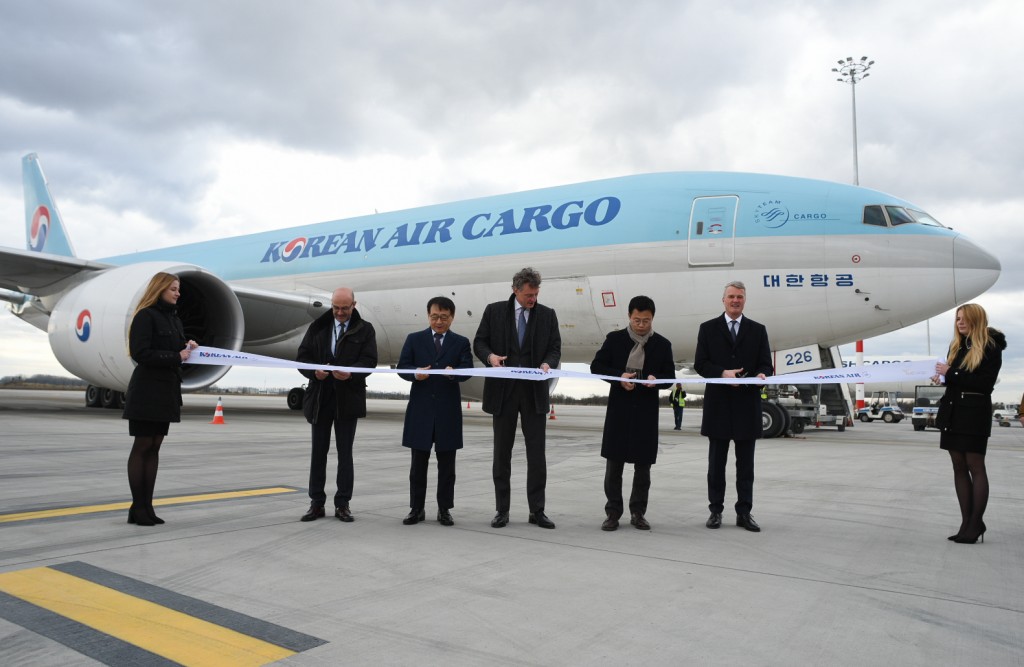First Seoul-Budapest cargo flight launched
Feb 24, 2020Budapest, Hungary - Budapest Airport welcomed the first direct Seoul-Budapest cargo flight on Friday 21st February 2020; Korean Air’s Boeing 777F type cargo aircraft taxied to the apron of BUD’s logistics base at 10:40. The aerial connection is not only an excellent opportunity for the large Korean companies operating in Hungary, but will also constitute a significant competitive advantage for the Hungarian economy in the import-export market.

Korean Air, one of the largest cargo airlines in the world, has opened a direct cargo flight between Seoul and Budapest. The Boeing 777F type aircraft flying the first scheduled South Korean cargo flight to Budapest was welcomed last week on the apron of the BUD Cargo City, Budapest Airport’s new, recently opened logistics base. Going forward, the flight will commute on the Seoul-Budapest-Frankfurt-Seoul route twice a week. The carrier will also launch a passenger flight to the South Korean capital on 23 May, which will operate three times a week between Budapest and Seoul during the summer schedule.
South Korea became the largest investor in Hungary last year. The factories of numerous companies significant from the perspective of air cargo, such as Samsung Electronics, Samsung SDI, Hanon Systems, SK Innovation and Doosan, are located at a transportation distance of just 1.5–2 hours from the BUD Cargo City. The new flight will provide new, efficient and high-quality transport solutions for these businesses, as well as efficient transportation opportunities for small and medium-sized Hungarian enterprises to Korea and into Korean Air’s entire network, via Seoul.
Levente Magyar, Deputy Minister at the Ministry of Foreign Affairs and Trade emphasized during the flight inauguration ceremony: “2019 was a special year in relations between Hungary and South Korea. The two countries celebrated the 30th anniversary of establishing formal diplomatic relations, and South Korea became the largest investor in Hungary, implementing projects to a value of 2.5 billion EUR, which is nearly half of the total investment portfolio. Trade also increased by one-third, compared to the previous year,” the Deputy Minister said.
“Budapest being added to the map of Korean Air’s passenger and cargo flights is a real milestone in the history of Budapest Airport. We are especially proud to welcome a new airline customer to the BUD Cargo City, the cargo hub of Central and Eastern Europe, just over a month after its opening,” said Dr. Rolf Schnitzler, the CEO Budapest Airport. “The direct aerial connection is not only a huge advantage for Hungarian and international companies, but also an opportunity for Hungary and the Hungarian capital airport to become the number one cargo hub in the region,” he added.
“Korean Air’s new scheduled cargo flight and the direct Soul-Budapest passenger service to be launched in May further strengthen commercial and diplomatic ties between Hungary and South Korea,” said H.E. Kyoo Sik Choe, the Ambassador of South Korea to Hungary. “On behalf of the embassy, we will do everything we can to ensure that these new aerial connection should be successful, for both countries,” he added.
“I am very confident, our cooperation will lead our business to connect and both economies to make a fruitful result. Furthermore, Incheon airport is becoming a major hub for cargo traffic in East Asia and Budapest will take advantageous position in the Central European market.” Said Jeong Soo Park, Managing Vice President for Europe of Korean Air.
In January 2020, Budapest Airport opened its new cargo base, the BUD Cargo City, which increases the airport’s total cargo handling capacity to 250 000 tons per year, with its world-class infrastructure and favorable location.
Similar Stories
JAS Worldwide signs SPA with International Airfreight Associates B.V.
JAS Worldwide, a global leader in logistics and supply chain solutions, and International Airfreight Associates (IAA) B.V., a prominent provider of comprehensive Air and Ocean freight services headquartered in the…
View Article
LATAM is once again part of the Dow Jones Sustainability Index
View Article
CPaT partners with Wizz Air, Europe’s leading ultra-low-cost airline, to enhance aviation training
View Article
Air Transat takes off to Tulum from Montreal and Quebec City
View Article
Air France KLM Martinair Cargo achieves record online sales and accelerates commercial transformation
View Article[Freightos Weekly Update] Frontloading continues to put pressure on transpacific rates
Transpacific ocean rates increased slightly last week and are about 15% higher than at the start of December as frontloading ahead of expected tariffs is keeping vessels full.
View ArticleGet the most up-to-date trending news!
SubscribeIndustry updates and weekly newsletter direct to your inbox!





